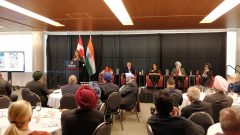 Baltej Singh Dhillon wasn’t trying to be a trailblazer. He was just a young man who wanted to serve his country.
Baltej Singh Dhillon wasn’t trying to be a trailblazer. He was just a young man who wanted to serve his country.
In 1988, when the college criminology graduate applied to join the RCMP after volunteering at a detachment in Surrey, B.C., Dhillon was rejected because he would not abide by the force’s dress code, which banned turbans and beards required by practicing Sikhs.
But he did not back down, pushing to change the RCMP uniform policy. And two controversial years later — he received hate mail and death threats, while supporters rallied behind the Charter of Rights and Freedoms — the federal government revised the rules.
Even though visible minorities and women remain under-represented, the RCMP has become increasingly diverse over the past couple decades, mirroring other national institutions. From time to time, fellow Sikhs and other officers of colour tell Dhillon that he inspired them to pursue a career in law enforcement.
This transformation is heartening, yet Dhillon — now Officer in Charge, Operational Readiness and Response, with the RCMP in Vancouver — is humble about his role. “I was just happy when the second Sikh officer came along seven years after me,” he says.
Dhillon will be one of the keynote speakers on Nov. 27 at Carleton’s Symposium on Sikhism, hosted by the university’s Canada-India Centre for Excellence (CICE). The day-long gathering, featuring presentations and panel discussions with scholars, business leaders and public officials will explore the emergence and global impact of Sikhism in the context of Canada’s commitment to multiculturalism.
“Canada has become an example of how immigrants from different backgrounds come together to bring peace and prosperity to the whole world,” says CICE Manager Harry Sharma. “One immigrant community that’s at the forefront in this
country is the Sikh community. Despite comprising a tiny percentage of the world’s population, Sikhs have made tremendous contributions to businesses, academia and culture. As the Canadian electorate and businesses look towards the future, they must have a better understanding of Sikhism.”
A Path That Brings People Together
To Dhillon, Sikhism is not so much a religion but a way of life, a path
that brings people together. His faith is a central part of who he is, with manifestations such as the weekly yoga and mindfulness class he teaches for RCMP officers.
Dhillon meditates every morning, which helps him remain compassionate and present throughout the ebb and flow of each day. This type of practice can give police the skills they need to better manage some of the challenges and stresses of their profession, including PTSD.
“In North America, we’re used to looking for complex answers,” he says. “You’ve just got to sit and be quiet for 11 minutes, man! Meditation can be a preventative measure.”
Dhillon appreciates the educational value of visible minorities succeeding in public careers. Seeing a man in a turban wearing a uniform can provide an opportunity to ask questions and learn from one another, and he feels that there is more cultural awareness about Sikhism in Canada than in the United States.
But he also knows that we still have a lot more work to do to overcome the sense that some careers are not safe or accepting for everybody.
“We want to get to a place where we’re not differentiating on the basis of culture, religion or ethnicity,” he says. “That’s how we can grow as a society. We’re all just Canadian citizens who have a certain background and choose to live a particular type of life.
“I don’t want to be remembered just as a Sikh police officer, but also that I was a good police officer. I want to leave behind a legacy beyond the fact that I was the first.”
Amplifying Mainstream Awareness about Sikhs
Mainstream awareness about Sikhs in Canada has been amplified by a number of prominent members of the community, including Minister of National Defence Harjit Sajjan and recently elected federal NDP Leader Jagmeet Singh.
This visibility is a byproduct of the growing population of Sikhs in Canada, says Baljit Singh Chadha, the president and founder of Montreal-based Balcorp Ltd., an international trade and marketing firm, and another speaker at the symposium.
There are roughly 700,000 Sikhs in Canada, he says, more than the 470,000 identified in the 2011 census because many do not self-declare.
When people emigrate to a new country, they often settle amongst others from the same homeland. This tendency has led to the growth of large Sikh communities in places such as Surrey and Brampton, Ont. Successive generations become more prominent in the educational and employment landscapes and branch out geographically, which helps break down misconceptions and fulfills the vision of Canada as a cultural mosaic.
“Multiculturalism in Canada may need some tweaking or fine-tuning, but it’s working,” says Chadha, who came to Canada as a university student in 1973 and, three years later, founded Balcorp with “borrowed capital and a rented desk.”
The company is focused on trade between North America and Asia, and although trade between India and Canada is growing, he says it’s fraction of what it should be.
Cultural awareness about India and Sikhism also has room to grow, which is why the Chadha Family Foundation has started and supported courses on Sikhism at several Canadian universities. These courses are not aimed at Indo-Canadian students — they’re for all Canadians.
“Most of the racist attitudes that develop are because of ignorance,” says Chadha. “We need to increase the knowledge we have about each other.”
Sharing, Service and Earning an Honest Living

The values of Sikhism have a lot of relevance at a time when several countries are closing their borders and becoming distrustful of outsiders, says Nikky-Guninder Kaur Singh, the Crawford Family Professor of Religion at Colby College in Maine, who will be part of a symposium panel discussing the emergence of Sikhism.
It is a religion rooted in sharing, service and earning an honest living, with a belief in gender and racial equality at its core.
However, in practice, patriarchal codes often dominate, says Kaur Singh, and dictate different roles for sons and daughters. She’s genuinely puzzled as to why, considering Sikhism’s egalitarian and inclusive scripture and the fact that although Sikhs have been coming to this part of the world for 150 years, the religion hasn’t permeated mainstream North American consciousness like Buddhism and Hinduism.
“There’s really a dearth of knowledge about Sikhism,” says Kaur Singh. “It’s really a forgotten tradition.
“Within Sikhism, there’s a built-in social responsibility to be part of the world, to serve society. Religion can be daunting for us in North America — especially other people’s religions — but we need to enter the public imagination.”
Gatherings such as Carleton’s Symposium on Sikhism can help spread awareness and, as Baltej Singh Dhillon says, “bring light to corners that are still dark.”